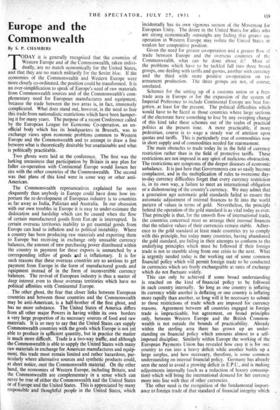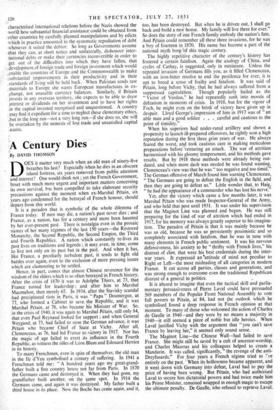Europe and the Commonwealth
By S. P. CHAMBERS
TODAY it is generally recognised that the countries of Western Europe and of the Commonwealth, taken indivi- dually, are no match economically for the United States, and that they are no match militarily for the Soviet bloc. If the economies of the Commonwealth and Western Europe were tnore closely co-ordinated, the position could be transformed. It is an over-simplification to speak of Europe's need of raw materials from Commonwealth sources and of the Commonwealth's com- plementary need for European manufactures and equipment, because the trade between the two areas is, in fact, immensely complicated. What does stand out, however, is the need to free this trade from nationalistic restrictions which have been hamper- ing it for many years. The purpose of a recent Conference called by the European League for Economic Co-operation, an un- official body which has its headquarters in Brussels, was to exchange views upon economic problems common to Western Europe and the Commonwealth and to attempt to draw a line between what is theoretically desirable but unattainable and what is 'politically practieable.
Two ghosts were laid at the conference. The first was the lurking uneasiness that participation by Britain in any plan for fuller co-operation with Continental Europe would loosen her ties with the other countries.of the Commonwealth. The second was that plans of this kind Were in some way or other anti- American. - The Commonwealth representatives explained far more eloquently than anybody in Europe could have done how im- portant the re-development of European industry is to countries as far away as India, Pakistan and Australia. In our obsession with our own troubles in Europe it is easy to under-estimate the dislocation and hardship which can be caused when the flow of certain manufactured goods from Europe is interrupted. In certain overseas territories inability to get essential goods from Europe can lead to inflation and to political instability. Where a country has been producing raw materials and exporting them to Europe but receiving in exchange only unusable currency balances, the amount of new purchasing power distributed within the country in payment for these exports is unmatched by a corresponding inflow of goods and is inflationary. It is for such reasons that these overseas countries are so anxious to get payment from Europe in the form of manufactured goods and equipment instead of in the form of inconvertible currency balances. The revival of European industry is thus a matter of deep interest even to those overseas territories which have no political affinities with Continental Europe.
The other ghost, the fear that closer links between European countries and between those countries and the Commonwealth may be anti-American, is a half-brother of the first ghost, and has no more substance. The United States of America differs from all other major Powers in having within its own borders a very large proportion of its necessary sources of food and raw materials. It is so easy to say that the United States can supply Commonwealth countries with the goods which Europe is not yet able to produce in spfficient quantity, but in practice the matter is much more difficult. Trade is a two-way traffic, and although the Commonwealth is able to supply the United States with many raw materials in exchange for American manufactures and equip- ment, this trade must remain limited and rather hazardous, par- ticularly where alternative sources and synthetic products could, at short notice, oust the Commonwealth material. On the other hand, the economies of Western Europe, including Britain, and the Commonwealth are complementary in a sense which can never be true of either the Commonwealth and the United States Or of Europe and the United States. This is appreciated by many responsible and thoughtful people in the United States, which incidentally has its own vigorous section of the Movement for European Unity. The desire in the United States for allies who are strong economically outweighs any feeling that greater cor operation in Western Europe may isolate the United States or weaken her competitive position.
Given the need for greater co-operation and a greater flow of trade between Europe and the overseas countries of the Commonwealth, what can be done about it? Most of the problems which have to be tackled fall into three broad groups, one dealing with tariffs and quotas, another with currency and the third with more positive co-operation on re- armament production. The three groups are not, of course, unrelated.
Schemes for the setting up of a customs union or a free- trade area in Europe or for the expansion of the system of Imperial Preference to include Continental Europe are best for- gotten, at least for the present. The political difficulties which would have to be faced in those countries where large sections of the electorate have something to lose by any sweeping change. of this kind take these schemes out of the realm of practical politics at the present time. A more practicable, if more pedestrian, course is to wage a steady war of attrition upon_ quotas and tariffs. This is particularly true of commodities now in short supply and of commodities needed for rearmament.
The main obstacles to trade today lie in the field of currency restriction rather than in the field of protective tariffs. These restrictions are not imposed in any spirit of malicious obstruction. The restrictions are symptoms of the deeper diseases of economic unbalance. It is just here that Governments can so easily become complacent, and in the multiplication of rules to overcome day- to-day currency difficulties forget that every currency restriction is, in its own way, a failure to meet an international obligation or a dishonouring of the country's currency. We may admit that a generation ago automatic gold standards failed to ensure the automatic adjustment of internal finances to fit into the world pattern of values in terms of gold. Nevertheless, the principle behind the operation of the gold standard is as vital today as ever. That principle is that, for the smooth flow of international trade, the countries concerned must so arrange their internal finances that the relative values of their currencies remain stable. Adher- ence to the gold standard at least made countries try to comply with this principle, but today many countries, having abandoned the gold standard, are failing in their attempts to conform to the underlying principles which must be followed if their foreign trade is not to stumble along from one crisis to the next. What is urgently needed today is the working out of some common financial policy which will permit foreign trade to be conducted in currencies which are freely exchangeable at rates of exchange which do not fluctuate widely.
This can only be achieved if some broad understanding is reached on the kind of financial policy to be followed in each country internally. So long as one country is inflating its currency while another is deflating or one country is inflating more rapidly than another, so long will it be necessary to submit to those restrictions of trade which are imposed for currency reasons. Agreement between all countries engaged in foreign trade is impracticable, but agreement, on broad principles only, between Western Europe and the British Common- wealth is not outside the bounds of practicability. Already within the sterling area there has grown up an under- standing on financial policy which amounts almost to a self- imposed discipline. Similarly within Europe the working of the European Payments Union has revealed how easy it is for one country to run into a heavy deficit while another builds up a large surplus, and how necessary, therefore, is some common understanding on internal financial policy. Germany has already seen the need to avoid a growing deficit in E.P.U., and is making adjustments internally (such as a reduction of luxury consump- tion) which will bring the international demand for her currency more into line with that of other currencies.
The other need is the recognition of the fundamental import- ance to foreign trade of that standard of financial integrity which characterised international relations before the Nazis showed the .worla how substantial financial assistance could be obtained from other countries by carefully planned manipulations and by edicts . which in practice amounted to the systematic repudiation of debt whenever it suited the debtor. So long as Governments assume ,that they can, at short notice and unilaterally, dishonour inter- national debts or make their currencies inconvertible in order to get out of the difficulties into which they have fallen, that development of foreign trade and foreign investment which would ,Lenable the countries of Europe and the Commonwealth to make isubstantial improvements in their productivity and in their , standards of living will be held back. When Pakistan sends raw Anaterials to Europe she wants European manufactures in ex- change, not unusable currency balances. Similarly, if Britain mvests in any overseas territory, she expects to be able to draw ,interest or dividends on her investment and to have her rights in the capital invested recognised and unquestioned. A country may find it expedient for a time to neglect these elementary ethics, , but in the long run—not a very long run—if she does so, she will be overtaken by the nemesis of lost trade and unsatisfied capital „wants.



































 Previous page
Previous page